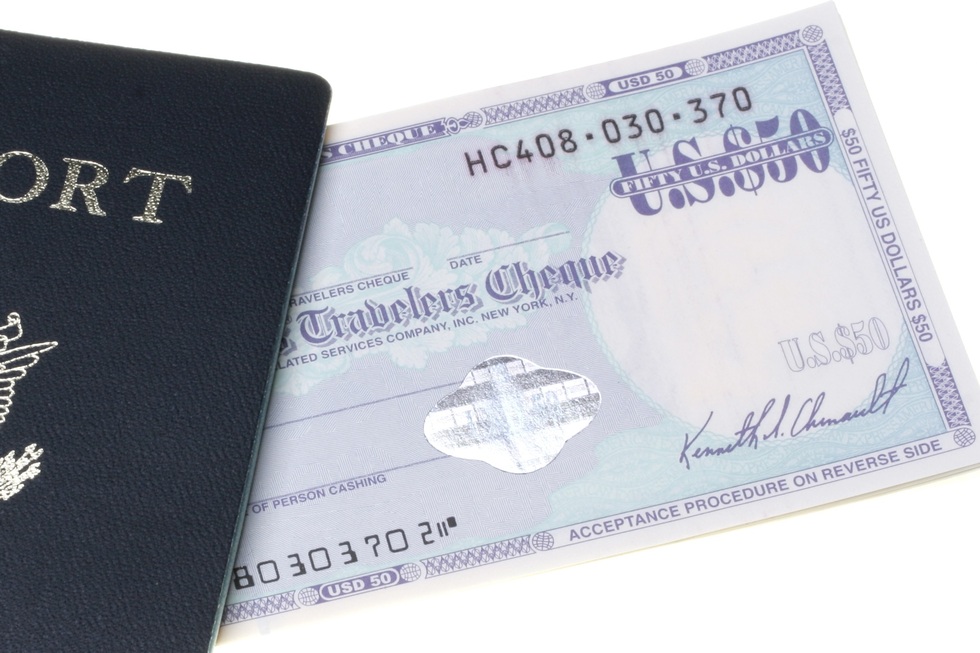For a long time, the standard advice about traveler's checks has been conditional: You can still buy them, but be prepared for them to be refused at many places.
Traveler's checks hail from an era before ATMs, credit cards, prepaid debit cards, and digital wallets, when travelers had to bring large sums of money with them to pay for their adventures. The traveler's check enabled people to remain well-funded without the risk of carrying actual cash.
But we no longer need to carry ready funds wherever we go. We have digital payments. And as that global technology has grown, the systems that handle archaic proxy forms of payment such as traveler's checks have vanished.
Many former issuers of traveler's checks, such as Thomas Cook, Bank of America, Chase, and AAA, have either discontinued their traveler's check programs or gone out of business altogether.
Yet there are still some consumers out there who seek out this form of payment out of familiarity.
American Express acts like they're still worthwhile. ("Travelers Cheques mean peace of mind," the Amex website promises.) So does Visa, which issues them through its banking partners.
Don't succumb. You could end up stuck with the checks after you get back home.
Previously, if you still had some traveler's checks in your possession after a trip, you could redeposit them in your bank account. After all, they never expire.
But now big financial institutions have changed the rules.
Last December, Charles Schwab, a major player in consumer investing, announced that it would no longer accept traveler's checks as deposits. (The company also announced it would no longer accept mobile deposits of money orders.) The warning was quietly slipped into a tiny box in the Charles Schwab app.

Financial institutions, like airlines, tend to imitate one another's consumer products. Your bank may follow suit, if it hasn't already.
In Chase's case, sales of traveler's checks were halted in 2015, but Chase still accepts them on deposit for now.
Many banks, though, will simply refer you back to the company that originally underwrote the transaction, so getting your cash might involve detective work and mailing the old checks to Europe to petition for a refund.
Yet a lot of online travel tips still present traveler's checks as an uncommon-but-viable option.
A 2022 post by First Republic Bank sold them as "still a worthy option to consider," and a 2022 post from Capital One warned there may be a fee to deposit unused traveler's checks, but didn't mention that many banks aren't even capable of doing that anymore.
I tested ChatGPT with a question about how to obtain traveler's checks for a vacation. Because the A.I. software is fed by all the bad information online, the chatbot told me traveler's checks "have become less common in recent years," but then nonetheless proceeded to instruct me how and where to buy some.
ChatGPT never warned me that I could potentially have trouble cashing the leftovers after my trip ends.
If you research more carefully, you can find stories of people who run across old traveler's checks but have a hard time locating anyone to redeem them—even at the buyer's own bank or the institution named on the check.
If you can't use traveler's checks easily and you can't easily get your money back afterward, they're not what I'd call a viable option anymore.
One statistic that's frequently cited online states that more than $1 billion in unredeemed traveler's checks are still circulating. Many of those checks are leftovers from long-ago vacations that came in under budget or vestiges of well-meaning grandparents who assumed buying traveler's checks as gifts was as safe as buying a bond.
Although that $1 billion figure may not be accurate, there's still no doubt that heaps of old traveler's checks are out there, forgotten in the backs of closets, sock drawers, and safe deposit boxes. The avenues for getting the value back out of the checks are swiftly closing.
So it's time to call it. Traveler's checks should never be used.
More to the point, if you have any old traveler's checks somewhere, get the value back out of them as soon as possible.
And don't buy any more ever again. Not unless you want to run the risk of locking your hard-earned money into pieces of paper.
When it comes to travel, any company that is still issuing traveler's checks probably shouldn't be. Consider them dead.






